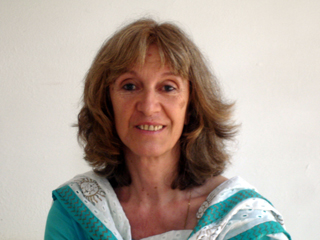| Ms Wirth is a native of Germany. For long, she was convinced that every Indian knows and treasures his great heritage. She noticed that there seemed to be a concerted effort to prevent even Indians from knowing how valuable this ancient Indian heritage is, so she started to point out its unique values. |

It is often said, Hinduism is not a religion but a way of life. Or is it a religion ? What is true ?
It depends on how religion is defined. Most people probably would say that religion is :
- About believing in an invisible Supreme Being, which is the cause of our existence,
- About methods and rituals to worship it,
- About living according to its laws or will.
In this case, Hinduism is definitely a religion. In fact, it is the Mother of all religions, because the Vedas had postulated already in very ancient times the existence of such a Supreme Being. They called it Brahman (from big) or Paramatma or Paramashiva or simply Tat (That) and declared that it cannot be imagined by the human mind. Nevertheless, a kind of description is given : Sat-Chit-Ananda (it means, it is Truth, Knowledge and Bliss). It is all-pervading and therefore the Essence (Latin : esse = to be) of everything, including us.
So why the question whether Hinduism is a religion ?
To discover this, we need to look at those religions where nobody has a doubt that these are religions. The term ‘religion’ was first used for the Catholic Church and later for Islam, too, and nobody has a doubt that these two are the main religions in today’s world.
These two religions also are about the 3 points I mentioned above. Yet there are significant differences.
The Supreme Being (called God or Allah respectively) of these 2 religions is not the essence in all, but is a separate entity which has certain personal traits. One most important trait is that it is jealous of other Gods and wants the whole of humanity to worship only Him (yes, the Supreme is clearly imagined as male). Both religions give out a dire warning : Those who do not accept this truth will burn eternally in Hell.
How do these religions know that this is the truth ? Because they claim that the Supreme Being himself has revealed this truth to one person (in the case of Christianity to Jesus Christ some 2,000 years ago and in the case of Islam to Prophet Mohammed some 1,400 years ago).
Here is where another definition of religion comes in. It is often said that religion is a ‘belief-system’. It needs blind, unverifiable belief in what the ‘founder’ of the religion has said and which is written down in a book. Here Hinduism is clearly not a religion.
Hinduism does not require blind belief. On the contrary, an open enquiry and an inner exploration into the truth, especially into the truth of one’s own being, is necessary to discover the Divine Essence in oneself; to discover that Atman (one’s own consciousness) is indeed Brahman, as the Vedas proclaim.
So is Hinduism not a religion ?
Let’s look at the meaning of the word religion. Religare (Latin) means to bind. Bind to whom or to what ?
Does it mean to bind to the Supreme Being or does it mean to bind to the doctrine ? If we look at history, the Church was adamant that the followers it had gained through (often forced) baptism must never leave the Church. Christianity had strict blasphemy laws with terrible punishment, like Islam even has today. So, it can be safely assumed that religion meant to bind its followers to the doctrine of the respective religion. The followers must ‘religiously’ stick to the doctrine.
If it would have meant to be bound to the Supreme Being, then surely Christianity or Islam should not have any objection if the Supreme is called by another name, e.g. Shiva, and the process of being bound to Him ‘Yoga’.
So strictly speaking, Hinduism is not a religion. But it is also not just a way of life. It has many rules how to live life in an ideal way. So one could say, Hinduism is an ideal way of life which is helpful in realising one’s ONENESS with the Supreme Being. This ideal way of life is not based on a dogmatic belief system, but on experiential wisdom.
(Courtesy : mariawirth.com)

 Radiant Thoughts of Sachchidananda Parabrahman (Dr) Jayant Athavale
Radiant Thoughts of Sachchidananda Parabrahman (Dr) Jayant Athavale We pay our obeisance a million times on the Birthdays (as per Tithi) of
We pay our obeisance a million times on the Birthdays (as per Tithi) of Leaflets depicting activism of Dr Jayant Athavale in Student Organisations
Leaflets depicting activism of Dr Jayant Athavale in Student Organisations Interests, hobbies, other education and skills of Dr Jayant Athavale Arts
Interests, hobbies, other education and skills of Dr Jayant Athavale Arts Sachchidananda Parabrahman (Dr) Athavale’s departure to the UK, Job and Research work
Sachchidananda Parabrahman (Dr) Athavale’s departure to the UK, Job and Research work The extraordinary Biography of Sachchidananda Parabrahman (Dr) Jayant Balaji Athavale, the promoter of ‘Hindu Rashtra’
The extraordinary Biography of Sachchidananda Parabrahman (Dr) Jayant Balaji Athavale, the promoter of ‘Hindu Rashtra’